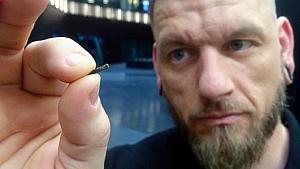Категории:
Полезные Сведенья
Кухонная Философия
Общество и его пороки
Новости
Еда и Питье
Техника
Разное
Личное
Природа
Фото/Видео
"Веселые" Картинки
Юмор
Пишите Письма
Реклама:
| Реклама |
|
August 3, 2017 A vending machine software firm recently implanted about four dozen of its employees with Radio-Frequency Identification (RFID) microchips that it says will allow the employees to navigate the office more conveniently. But the move has raised concerns about potential ethical and security issues.
Three Square Market, based in Riverdale, Wisconsin, said it surgically implanted the chips in about 50 volunteers on Tuesday, giving the workers the ability to make purchases, unlock doors, log into computers and perform other office functions with just the wave of a hand. The firm employs 95 workers at its Wisconsin location and has more than 200 other employees stationed around the globe. Three Square Market’s Chief Operating Officer, Patrick McMullan, estimates that the technology will become standardized within the next decade or so, eventually allowing people use their chips for passports, public transit and various purchasing opportunities. He, too, was microchipped, and said the program was "going well" since its implementation. "The reality is, it’s coming and it’s coming soon," McMullan told ABC News. "And I think you’re going to see a whole new wave of people who are wanting to get into this.” The company, which also operates about 6,000 inmate kiosks through its corrections industry business, says the chips are safe and encrypted to protect the user’s data, but some security and technology experts are questioning if the implants are ethical. Three Square Market says the chips are less invasive than mobile phones and apps, which it says are rich with all types of GPS tracking data. Michael Zimmer, director of the Center for Information Policy Research at the University of Wisconsin-Milwaukee, said the implants are fundamentally different than other technologies because the user has less control over the experience. “With my phone, I can turn it off, I can to leave it at my desk and I can control the apps that I have access to,” Zimmer told ABC News. “There are a lot more ways that I can manage what people know about me.” With the chip implant, “I simply lose that element on control because I can’t turn it off and I can’t just take it out and put it back in,” he said. “I think that’s a fundamental change in the way we control what access people have to our bodies and what we’re doing.” He’s also worried that the chips could eventually lead to larger scale tracking of one's movements and behaviors -- such as what you purchase or how long you stay in the restroom -- as the technology evolves. “I think we need to be a little more cautious, making sure that we’re not going too quickly and that we understand the implications,” Zimmer said. “There are some things that we need to make sure we’re paying attention to before we start walking down this path.” https://www.yahoo.com/gma/microchip-implants-chart-territory-call-ethical-nightmare-153805161--abc-news-topstories.html Тэги: Aug2017 Новости Общество Техника Темы, имеющие некоторое отношение к этой (русскоязычный поиск в mysql все же очень не совершенен): Фраза дня May 19, 2014 Фраза дня October 15, 2016 Идея модного стартапа October 22, 2018 Злая шутка недели December 22, 2016 Когда же у украины будет своя доменная зона? November 11, 2009 posted by Rosewell at August 3, 2017 Свернуть Что характерно, чем будущее, тем более американцев движется в Куэнку.
Архив:Apr2025 Mar2025 Feb2025 Jan2025 Dec2024 Nov2024 Oct2024 Sep2024 Aug2024 Jul2024 Jun2024 May2024 Apr2024 Mar2024 Feb2024 Jan2024 Dec2023 Nov2023 Oct2023 Sep2023 Aug2023 Jul2023 Jun2023 May2023 Apr2023 Mar2023 Feb2023 Jan2023 Dec2022 Nov2022 Oct2022 Sep2022 Aug2022 Jul2022 Jun2022 May2022 Apr2022 Mar2022 Feb2022 Jan2022 Dec2021 Nov2021 Oct2021 Sep2021 Aug2021 Jul2021 Jun2021 May2021 Apr2021 Mar2021 Feb2021 Jan2021 Dec2020 Nov2020 Oct2020 Sep2020 Aug2020 Jul2020 Jun2020 May2020 Apr2020 Mar2020 Feb2020 Jan2020 Dec2019 Nov2019 Oct2019 Sep2019 Aug2019 Jul2019 Jun2019 May2019 Apr2019 Mar2019 Feb2019 Jan2019 Dec2018 Nov2018 Oct2018 Sep2018 Aug2018 Jul2018 Jun2018 May2018 Apr2018 Mar2018 Feb2018 Jan2018 Dec2017 Nov2017 Oct2017 Sep2017 Aug2017 Jul2017 Jun2017 May2017 Apr2017 Mar2017 Feb2017 Jan2017 Dec2016 Nov2016 Oct2016 Sep2016 Aug2016 Jul2016 Jun2016 May2016 Apr2016 Mar2016 Feb2016 Jan2016 Dec2015 Nov2015 Oct2015 Sep2015 Aug2015 Jul2015 Jun2015 May2015 Apr2015 Mar2015 Feb2015 Jan2015 Dec2014 Nov2014 Oct2014 Sep2014 Aug2014 Jul2014 Jun2014 May2014 Apr2014 Mar2014 Feb2014 Jan2014 Dec2013 Nov2013 Oct2013 Sep2013 Aug2013 Jul2013 Jun2013 May2013 Apr2013 Mar2013 Feb2013 Jan2013 Dec2012 Nov2012 Oct2012 Sep2012 Aug2012 Jul2012 Jun2012 May2012 Apr2012 Mar2012 Feb2012 Jan2012 Dec2011 Nov2011 Oct2011 Sep2011 Aug2011 Jul2011 Jun2011 May2011 Apr2011 Mar2011 Feb2011 Jan2011 Dec2010 Nov2010 Oct2010 Sep2010 Aug2010 Jul2010 Jun2010 May2010 Apr2010 Mar2010 Feb2010 Jan2010 Dec2009 Nov2009 Oct2009 Sep2009 Aug2009 Jul2009 Jun2009 May2009 Apr2009 Mar2009 Feb2009 Jan2009 Dec2008 Nov2008 Oct2008 Sep2008 Aug2008 Jul2008 Jun2008 May2008 Apr2008 Mar2008 Feb2008 Jan2008 Dec2007 Nov2007 Oct2007 Sep2007 Aug2007 Jul2007 Jun2007 May2007 Apr2007 Mar2007 Feb2007 Jan2007 Dec2006 Nov2006 Oct2006 Sep2006 Aug2006 Jul2006 Jun2006 May2006 |
